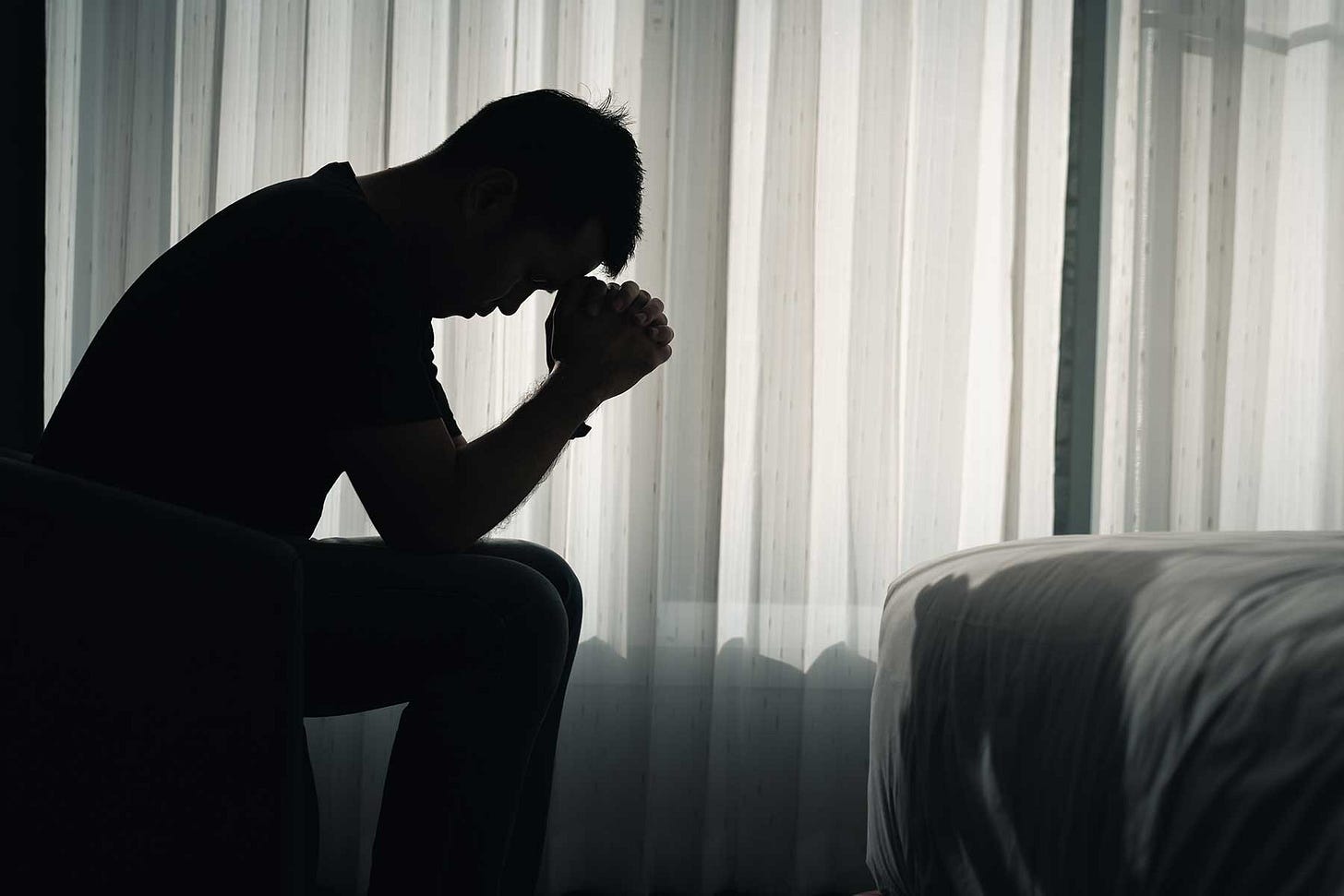He Loved You More Than Life Itself — And It Killed Him
Men love like mountains, and fall like them too.
This essay is free, but with Premium Membership you get MORE. Join today.
by John Mac Ghlionn
June 29, 2025
They call it broken heart syndrome. The clinical term is takotsubo cardiomyopathy, a name that sounds like something plucked from a Japanese horror film. But the horror is very real — and very Western. It mimics a heart attack. Your chest tightens, your breath shortens, and your heart — quite literally — starts to fail. Most people think of it as a woman’s affliction. But the truth is far darker: when it hits men, it kills.
A recent study looked at 200,000 cases of broken heart syndrome in the United States. Women made up 83 percent of cases. But men were more than twice as likely to die from it. That’s not a coincidence. It speaks to something deeper — something cultural, psychological, and biological. Women may suffer more frequently, but men suffer more fatally.
Men don’t break often. But when they do, they don’t bend — they shatter. And what’s left doesn’t always go back together. We like to pretend that men are emotionally inert. Stoic. Unbothered. But that’s projection. It’s not that men don’t feel deeply. It’s that they’ve been trained — by culture, by history, by women themselves — not to show it. To take it on the chin. To go to work. To pay the mortgage. To carry the coffin.

They are conditioned to endure, not express. To absorb pain like pavement absorbs rain — quietly, without complaint. And so they love in silence. They lose in silence. And sometimes, they die in silence.
This is the uncomfortable truth modern culture tiptoes around — because admitting it would upend too many narratives: men love more unconditionally than women. Not because they’re better, but because when they love, they do so with every ounce of their being. They don’t keep score, strategize, or ration affection like it’s a currency that might run out. When a man loves — I mean, truly loves — he hands over the deed. No insurance, no fallback, no emotional exit route.
He doesn’t have a group chat dissecting every word. He’s not bookmarking potential replacements or building a public archive of the relationship to turn the story into a performance later. He’s not loving for validation; he loves because it’s real. And when he commits, it’s total — not out of duty, not out of fear, but because that’s how men love when they mean it. That’s precisely why it wrecks them when it ends. They didn’t just invest time; they invested themselves. They put something eternal into something fragile, and when it breaks, there’s no parachute.
It’s not that men love better. It’s that they love harder — and with fewer safety nets. So when it all falls apart, there’s nothing left to catch them. When that love is lost — through betrayal, death, divorce — he doesn’t rebound with brunches and girl groups and TikTok therapy. He bottles it. He builds a wall around the crater and keeps going. Until one day, the wall cracks. And the heart does, too.
There’s only so long you can white-knuckle grief before it starts chewing through the bone. Ask any man who’s been left after years of loyalty. Ask the widower who hasn’t taken off his wedding ring. Ask the father alienated from his children. Their grief doesn’t announce itself. It settles deep, like pressure beneath the earth, invisible but relentless. It changes their posture. Their sleep. Their appetite for life. Not all at once, but slowly, over time.
It doesn’t wail — it waits. It doesn’t erupt — it erodes. This doesn’t mean women don’t feel pain. Of course they do. But culturally, structurally, socially, they’re permitted to process it. They’re encouraged to speak, to cry, to be supported. The system protects them. It gives them language. It validates their sadness.
The culture hands them a script. Men are handed a shovel. We see it in the numbers. Men are three to four times more likely to kill themselves after a divorce. They’re far more likely to develop addictions post-breakup. And now we know they’re more likely to die of grief. Not metaphorical heartbreak, but actual cardiac failure.
And yet the myth persists: that men are the colder sex. That they detach. That they move on. That they don’t feel as deeply. What a convenient lie.
The reality is that men love with a desperation that is rarely noticed until it’s too late.
It’s the kind of love that doesn’t ask for applause. It’s shown in the ugly, ordinary things — fixing the car, working the job he hates, waking up before sunrise, staying, sacrificing, and never asking for credit. And when it ends, they don’t get support. They get silence. Shame. And sometimes, they get a hospital bed, wondering why their chest feels like it’s caving in — because it is.
We’ve feminized love, made it seem like an arena where women are the natural experts and men fumble through. But the data says otherwise. And any honest woman who’s broken a good man’s heart knows otherwise.
So maybe it’s time we retire the falsehood. Maybe it’s time we admit that a man’s love, when real, isn’t just deep — sometimes, it’s fatal. He won’t write poems about it. He won’t post about it. But he’ll carry it. Until it kills him. No fanfare. No second chance. Just a name on a stone and a warning no one heeded.
— John Mac Ghlionn is a psychosocial researcher and essayist. His work has been published by the New York Post, The New York Daily News, Newsweek, National Review, Newsweek, and The American Spectator, where this essay first appeared.









If that’s what the data says, then it’s likely true…for most.
However not for all. Unless I’m a freak of nature, I have loved deeply, lost two wives, and am currently working on number three.
Perhaps it is tied in with my reaction to the death from ALS of my father when he was 69. He worked hard all his life and was preparing for retirement when the disease hit him. I was angry with God for a good while, but one day while reading the last chapters of Job the realization hit me that I’m not God and can’t possibly know all the why’s and how’s of life. I simply have to trust Him.
So when my first wife was diagnosed with ALS, after almost two years of seeing various doctors, I immediately went into mourning, as I already knew the final result. At one point she was consoling me. On her last day, she was restless and agitated, so I sat next to her and sang a couple of verses of “Jesus Loves Me.” She had taught Sunday School for years, and did children’s church, where they marched out of the sanctuary to that song. She settled right down, and passed peacefully later that night. Which happened to be the day before I turned 64. Put a whole new meaning for me on the Beatle’s “When I’m 64.”
A little over a year later, I met the woman who became my second wife. Turns out we were born two days apart on opposite sides of the country: she in Brooklyn, I in Sacramento, and we met in the middle in Corpus Christi.
We soon discovered we were soul mates. I sometimes teased her that we were supposed to be twins but she took a couple of extra laps around the earth before landing. We had three wonderful years, and then she developed a problem with her hip. Again with rounds of doctors and chiropractors until finally an X-ray revealed a tumor.
Five months of a downhill roller coaster ride, and she decided to come home from MD Anderson in hospice. Two weeks later she was gone. On the night she died, I sat beside her on the hospital bed set up in our front room, told her how much I loved her, said goodbye and went to bed. Somewhere between 2 and 3 in the morning a friend who was sitting with her woke me and gave me the news.
That was 10 years ago. I have gone through a number of medical things in the past five years and had reached a point where I thought “That’s it. I’m done chasing after women.” Then at a friend’s workout studio, a coach who had been injured returned and caught my attention. I decided my earlier decision was premature, and now I am working on wife number three.